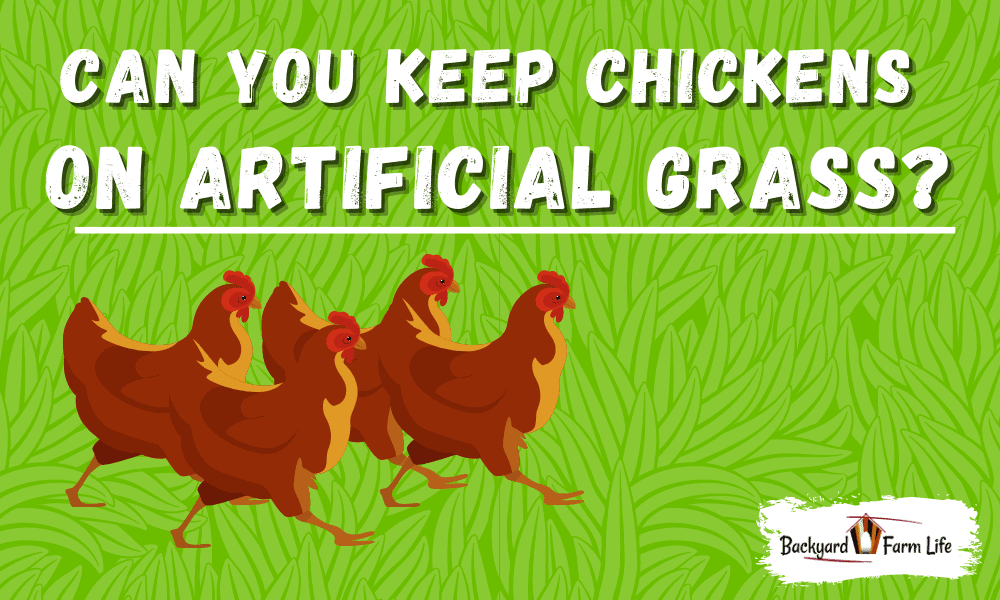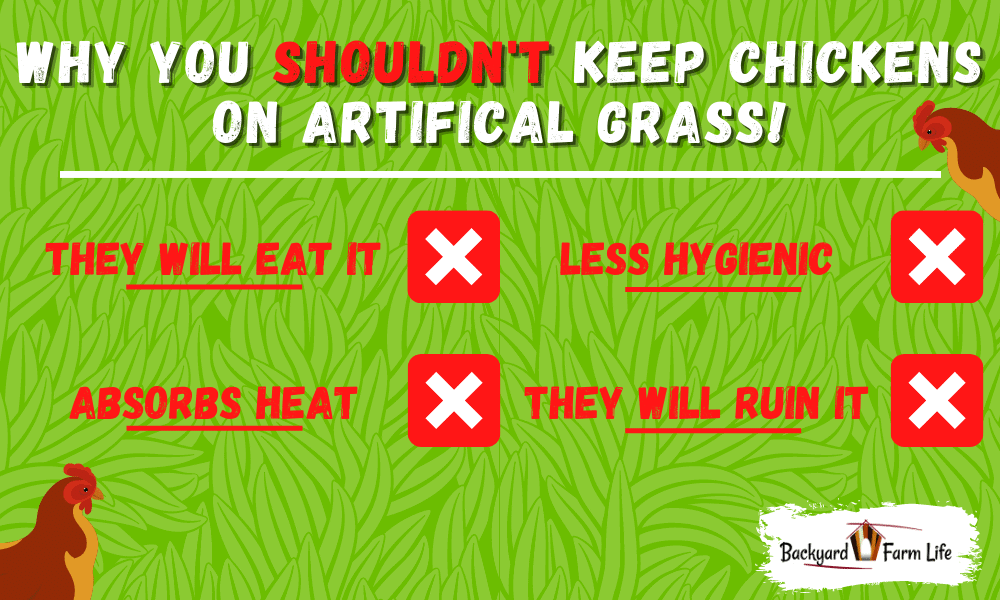There’s something about a free-ranging backyard chicken that is just so wholesome to watch.
But, not every chicken owner has access to free paddocks of lush, untouched grass for their chickens to forage on.
So some savvy backyard chicken owners have to get resourceful and seek out more accessible, easy to maintain, and safe grounds for raising their chickens.
One thought often comes to mind: what about artificial grass/turf?
Well… to save you a lot of effort and heartache, here’s whether you can keep chickens on artificial grass or turf, whether chickens ruin artificial grass, and what the real risks are.
Contents
Can You Keep Chickens On Artificial Grass?

At first thought, you would assume that raising chickens on artificial grass is completely harmless, and may even come with its benefits.
Sure, artificial grass doesn’t wear as easily as normal grass, it’s easy to source, and seems easy to clean.
But, there are some inherent downsides and even risks to raising chickens on artificial grass that you absolutely must know before deciding if it’s right for you and your flock.
These risks are:
1) Chickens may ingest the fake grass
2) Artificial grass is much less hygienic
3) Artificial grass absorbs too much heat
Case in point: although it may stand longer and be easy to clean, artificial grass is not recommended to use to keep your chickens on long-term.
Will Chickens Ruin Artificial Grass?
Putting aside any advantages and risks of raising chickens on artificial grass, there’s one more glaring downside you would have to put up with.
If you’ve raised chickens for any amount of time you’ll know just how much they love to dig and scratch the earth in an attempt to uncover all the yummy insects and bugs that might hide underneath.
Now, chickens won’t discriminate. They don’t distinguish between real grass and fake, so they end up tearing and ripping much of the artificial grass.
So, although it will take them some time, chickens will eventually and inevitably ruin artificial grass.
Although chickens do tear up normal grass too, since it’s living it often just grows back before too much damage is done!
Why You Shouldn’t Keep Chickens On Artificial Grass

In addition to the fact that your artificial grass will eventually be ruined if you raise chickens on it, there are some much more serious risks to be aware of.
These risks include your chickens eating the artificial, plastic grass, build-up of waste and ammonia in the turf, and unnatural heat absorbency.
It’s for these key reasons which spell out why you should not keep chickens on artificial grass – at least long term anyway.
Here’s everything in more detail.
Chickens Will Eat It
Chickens have a natural instinct to try to eat pretty much whatever they can. From gravel to dirt, to grass, they’ll give everything a go.
If you’re allowing chickens on artificial grass, they’ll naturally try and eat some thinking it’s normal grass or pasture.
As we know artificial grass is made out of synthetic materials. Although there have been no extensive studies conducted on the nutritional value of artificial grass or turf, it’s safe to assume it’s simply not healthy. It may even be dangerous for your chickens to eat.
Much Less Hygienic
Chickens constantly feel the need to eat. Sure, eating nutritious seeds and other foods is good for making eggs, but another byproduct is waste – and they make a lot of it!
Normal grass, ground, and dirt act as a natural filtration system, allowing waste to seep down under the grass and actually nourish it as it breaks down. They say chicken manure is one of the best natural fertilizers out there.
However, artificial grass has no such filtration system. This means that any waste that ends up on the artificial grass will simply sit there, with no way to decompose.
The result is just bad all around. It can lead to a build of ammonia, an unpleasant smell, and harmful levels of bacteria.
Overall, artificial grass is just so much less hygienic than normal grass, so much so that it could actually be considered unsafe to house chickens on.
Unnatural Heat Absorption
Synthetic turfs and artificial grasses are primarily made of polyethylene or nylon strands sewn onto a rubber base.
As you can imagine, these materials absorb heat completely differently than normal grass. Plus, artificial grass has no natural way of cooling.
The result? A higher likelihood of your chickens suffering from heat stress, or dehydration, particularly in the hot summer sun.
Similarly, in winter the earth naturally provides geothermal energy that chickens can absorb through their feet. Chickens are warm-blooded, after all. Artificial grass effectively creates a barrier between the earth and your chickens, making it harder for them to the geothermal energy to their advantage.
Alternative To Grass To Raise Chickens On
So if you don’t have access to a nice lawn to raise chickens on, and artificial grass won’t cut it, then what options are you left with?
Well, it doesn’t have to be grass, but it should be some kind of environment with dirt, ground, bark, shrubs, or pasture.
Commercial operations still raise chickens inside barns too. But, it’s highly recommended to allow enough space for your chickens to free-range on natural surfaces for their health and wellbeing – at least for some of the time.
If you have the option, it’s always best to provide your chickens with SOME grass, White Clover or Birdsfoot Trefoil are great alternative lawns.
To Conclude
Sure, raising chickens on artificial grass temporarily can be OK. But, as a long-term play, artificial grass has too many risks to your chicken’s health and wellbeing that it’s simply not worth it.
Artificial grass has no natural filtration system like normal grass, leading to some very unhygienic turf. Your chickens will try to eat it too. Plus, it doesn’t absorb and release heat quite like normal grass.
For these reasons, it’s not recommended to keep your chickens on artificial grass.
Even if you don’t have a lawn, try to create a space that resembles the natural environment. Bark, dirt, or ground can work just fine and are all more suitable than artificial grass!
